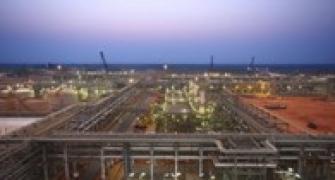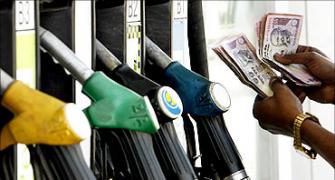 Steel manufacturers on Wednesday hit out at 'unilateral' decision of the Oil Ministry to curb natural gas supplies from Reliance Industries' KG-D6 fields to non-core users, saying only a ministerial panel was empowered to take such decision.
Steel manufacturers on Wednesday hit out at 'unilateral' decision of the Oil Ministry to curb natural gas supplies from Reliance Industries' KG-D6 fields to non-core users, saying only a ministerial panel was empowered to take such decision. However, the oil ministry, which called a meeting of its users, under direction from Bombay High Court, is unlikely to heed to their request, sources said.
Sponge iron makers Essar Steel, Welspun Maxsteel and Ispat officials at a meeting called by Petroleum Ministry on the issue, stated that only the Empowered Group of Ministers (EGoM) headed by Finance Minister Pranab Mukherjee could cut supplies as it was EGoM which had made gas allocation to them.
"We heard all of them and will pass order by May 18 as directed by the Bombay High Court," said Apurva Chandra, Joint Secretary (Marketing), Ministry of Petroleum and Natural Gas.
Reliance, which was also represented at the meeting, had on May 8 cut supplies to sponge iron makers, refineries and petrochemical plants so that its falling output can meet full demand of core users in fertiliser and power sector.
Chandra said Essar pleaded that it would lose about Rs 1000 crore (Rs 10 billion) annually if it is to replace KG-D6 gas with either liquid fuel or imported LNG at its plants. Similarly, Welspun and Ispat said they would lose Rs 150-200 crore (Rs 1.5-2 billion).
Power and fertiliser companies, who too were invited for today's meeting, stated that they needed their full quota of KG-D6 gas to meet peak season demand. Reliance on the other hand said it was the most affected by the oil ministry's order curtailing supplies to non core users and was only following ministry's diktat.
The company said it had no role either in fixing the price or deciding on its users. The EGoM had in 2008 and then in 2009 allocated KG-D6 among users in fertiliser, LPG plants, power units, steel makers, refineries, petrochemical units and city gas firms.
Oil Ministry's curtailment order last month followed drop in production at KG-D6 fields to less than 50 million standard cubic meters per day while Reliance had signed firm contracts for 57.15 mmscmd and needs another one mmscmd for the East-West pipeline that ferries the gas.
Core sector users have signed up for 47.6 mmscmd and the ministry wanted their demand to be met first and any gas left after this could go to users in steel, refineries and petrochemical sector. Chandra said the non-priority users were getting about one-fifth of their contracted supplies.
The ministry's decision to prioritise KG-D6 gas was challenged by Ispat Industries and Welspun Maxsteel in the Bombay High Court and Essar Steel in Delhi High Court.
The Bombay High Court on May 9 directed the oil ministry to "give the petitioners an opportunity to present their cases and subsequently, take a decision."
In addition, it was also directed that other affected parties may also be given a similar opportunity. "In compliance of the direction of the Bombay High Court, Joint Secretary (Marketing) in (Oil) Ministry heard the affected/interested parties today," a ministry official said.
The oil ministry directive on curtailment of supplies followed a sharp drop in output at KG-D6 fields. Production fell from 61.5 mmscmd achieved in March, 2010 instead of rising to about 69 mmscmd as was projected previously.
Reliance has signed customers for 57.15 mmscmd of gas including 9.57 mmscmd to non-core users. In face of falling output, Reliance had since July last year made a pro-rata cut in supplies to all its customers, including priority users, the official said. Of the 57.17 mmscmd of KG-D6 gas for which contracts have been signed, Essar Steel had signed up for 3.2 mmscmd, Welspun Maxsteel 0.40 mmscmd and Ispat 0.59 mmscmd.
Besides, Reliance's petrochemical plant got 1.17 mmscmd and a sizeable 4.21 mmscmd went to refineries, including the Jamnagar units of Reliance.
"Supplies to non-core users has not dried up completely as Reliance has some gas left after meeting priority sector requirement," the official said pointing to Essar Steel getting 0.6 mmscmd. Reliance had previously resisted implementing the order but fell in line once the ministry cited last year's Supreme Court directive which held that only government had the right to decide users of the gas.
The government had accorded highest priority to urea plants, followed by LPG extraction units, power plants and city gas distribution projects while allocating KG-D6 gas.
Sixteen fertiliser plants have been allocated 15.34 mmscmd of KG-D6 gas on a firm or permanent basis, while 28 power plants in the public and private sector have got 28.99 mmscmd. LPG plants of state-owned gas utility GAIL India had been allotted 2.59 mmscmd.
Reliance's twin refineries at Jamnagar had signed up for 2.34 mmscmd of KG-D6 gas while its petrochemical plants at Gandhar and Nagothane got 1.17 mmscmd. Implementation of oil ministry's priority order meant that supplies to these have been cut down drastically.









